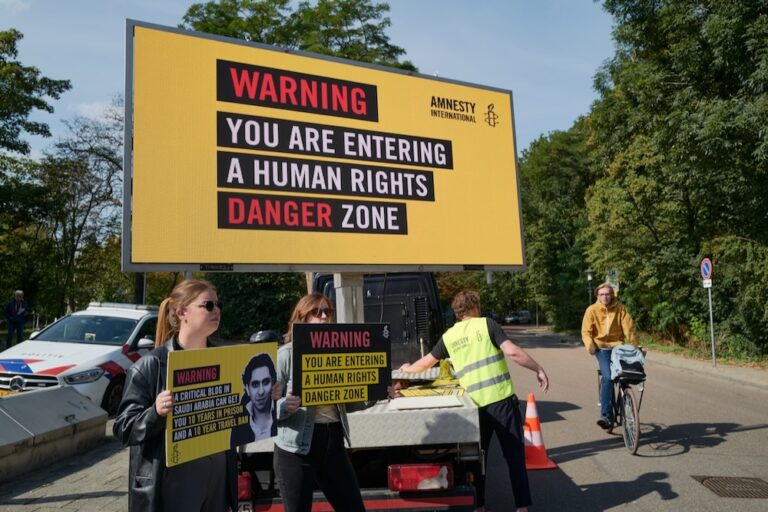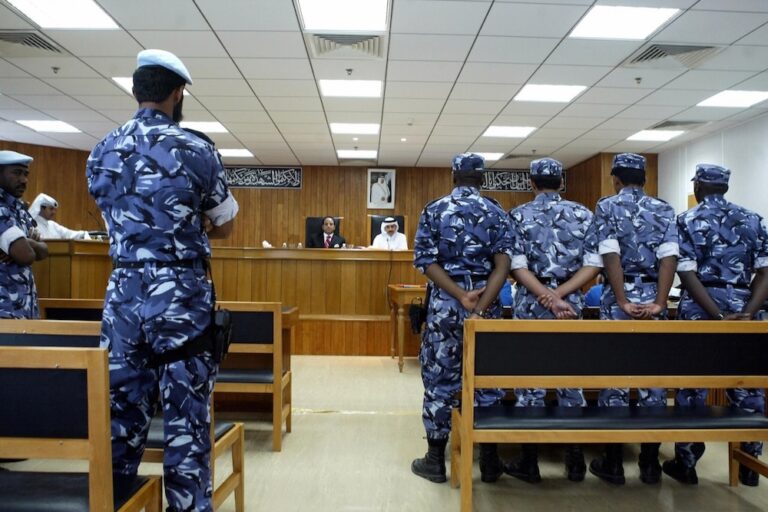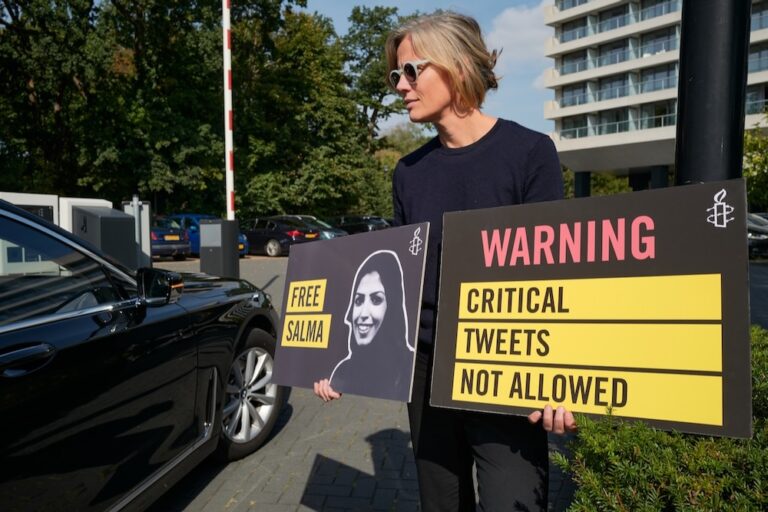The Specialized Criminal Court, set up in 2008 to try terrorism cases, is increasingly used to try peaceful dissidents and rights activists on politicized charges and in proceedings that violate the right to a fair trial and the rights to freedom of expression.
(Human Rights Watch/IFEX) – Beirut, April 27, 2012 – Saudi Arabia should abolish the Specialized Criminal Court, set up in 2008 to try terrorism cases, but increasingly used to try peaceful dissidents and rights activists on politicized charges and in proceedings that violate the right to a fair trial, Human Rights Watch said today. In April, it sentenced two people to prison for their peaceful activism, and the trials of at least four others are ongoing, in violation of their rights to freedom of expression.
“Trying Saudi political activists as terrorists merely because they question abuses of government power demonstrates the lengths the Saudi government will go to suppress dissent,” said Christoph Wilcke, senior Middle East researcher at Human Rights Watch. “The trial of peaceful reformers in a terrorism court underlines the political nature of this court.”
The charges against the rights activist and the dissident do not allege that they used or propagated violence.
On April 10, 2012, Judge Abd al-Latif al-Abd al-Latif sentenced Muhammad al-Bajadi to four years in prison and banned him from foreign travel for another five years. The court charged al-Bajadi, who has been on a hunger strike since March 11, with unlawfully establishing a human rights organization; distorting the state’s reputation in media; impugning judicial independence; instigating relatives of political detainees to demonstrate and protest; and possessing censored books.
On April 11, 2012, the court also sentenced Yusuf al-Ahmad, an academic and cleric, to five months in prison for “incitement against the ruler, stoking divisions, harming the national fabric, diminishing the prestige of the state and its security and judicial institutions, and producing, storing, and publishing on the internet things that can disturb public order.”
On July 7, al-Ahmad published a video on his Twitter account in which he called on King Abdullah to release arbitrarily detained persons. Security forces arrested him the next day. Domestic intelligence agents arrested al-Bajadi on March 20, when several dozen families of detainees had gathered in front of the Interior Ministry in Riyadh to press officials for the release of their relatives, some of whom had been detained for seven or more years without trial. Al-Bajadi is a founding member of the Saudi Association for Civil and Political Rights (ACPRA), which the government has not licensed.
On February 22, 2012, the Specialized Criminal Court began the trial of Khalid al-Juhani, who spoke to international journalists on the designated Saudi Day of Rage of March 11, 2011, to which only a handful of protesters showed up, in part because of heavy police presence. The Interior Ministry, on March 5, 2011, reiterated its ban on public protests. Al-Juhani demanded democracy and freedom of speech in his interview with the BBC, and was immediately arrested and has been detained ever since. He is charged with being present at the place of a prohibited demonstration; distorting the kingdom’s reputation; and being in touch with Sa’d al-Faqih, a Saudi dissident abroad, according to a person familiar with the case who said officials designated the charge sheet “secret.” His second trial session is due to be held at the end of April.
“Given their experience with the real harm caused by terrorist attacks, one would expect Saudi authorities to know the difference between peaceful political speech and acts of violence,” Wilcke said.
Also in February, the court stopped the trial of Sa’id bin Zu’air, a former university professor arrested in 2007, begun about two months earlier, for a long list of charges related to the religious and political positions he had supposedly publicly adopted. A relative of bin Zu’air told Human Rights Watch that the prosecution could not substantiate its claims, which he said were based on statements by fellow prisoners. This is the only time to Human Rights Watch’s knowledge that the court has not convicted a defendant accused before it of crimes related to peaceful expression. Bin Zu’air was released in February.
In December 2011, the court began the trial of Mubarak bin Zu’air, a lawyer and Sa’id’s son, for “encumbering” the affairs of the ruler, not complying with rules and regulations, attending an unlicensed gathering, spreading sedition, and not obeying religious scholars. Mubarak’s arrest came on March 20, 2011, as he was driving to the Interior Ministry to persuade a small crowd gathered there to meet officials to disperse. Mubarak, as the leader of a group of relatives of long-term detainees, had met Prince Muhammad bin Nayef, assistant minister of interior for security affairs, one day earlier to discuss the release or speedy and fair trial of their relatives, and was on his way to deliver Prince bin Nayef’s promises of releases and trials.
Mubarak was released on bail in February 2012, but his trial continues. The same relative told Human Rights Watch, however, that a royal decree had ordered trials of peaceful dissidents to be transferred to regular Sharia (Islamic law) courts away from the Specialized Criminal Court, and that this had occurred with Mubarak’s case.
This order, if it exists, is not being consistently followed, Human Rights Watch said. For example, in March and April, three trials of peaceful dissidents began before the Specialized Criminal Court. Mikhlif al-Shammari is being tried on seven charges: attempting to distort the reputation of the kingdom of Saudi Arabia in foreign public opinion and belonging to suspicious organizations; producing and sending things that can disturb public order and religious values through the internet; stoking divisions and inciting public opinion against various public institutions of the country; doubting and impugning the fairness and integrity of officials in government agencies without sound proof; defaming instructions of religious scholars and describing them as calling for fragmentation, hatred, and takfir (declaring a Muslim an unbeliever) in international television; using his writings, which he claims to be nationalistic, for gain for himself and his tribe and using them to put pressure on the rulers of the country; and lying about belonging to the Human Rights Commission in the Eastern Province. The evidence the prosecution listed for these charges consisted entirely of al-Shammari’s published articles or media interviews, and no claim was made that they incited violence, according to a copy of the charge sheet on file with Human Rights Watch.
Security forces arrested al-Shammari in June 2010, and held him in pretrial detention, initially on the charge of “annoying others,” before his release on bail in February 2012. He received the new charges at his first trial date in March.
In April 2012, the trials against Fadhil al-Manasif, a human rights activist, and Fadhil al-Sulaiman, a religious activist, also began before the Specialized Criminal Court. Al-Sulaiman was arrested in March 2011, for participating in two protests in the Eastern Province’s city of Hofuf where he spoke to the assembled crowd (his defense lawyers claim the prosecution confused the protests – they say he protested at the first, for which the local governor issued an amnesty, and tried to prevent the second).
Continued protests, since February 2011, in the heavily Shia Muslim-inhabited Eastern Province, have called for an end to religious discrimination and equal rights with the Sunni Muslim majority. Al-Sulaiman is now also charged with resisting arrest and breaking the camera of a member of the security forces at one of the protests, which he denies. Shia protesters on several occasions have tried to prevent intelligence forces in the protest crowd from filming protesters, leading a suspected member of the intelligence forces to draw a gun, shoot, and injure three protesters in a peaceful march in Qatif, another Eastern Province city, in March 2011, according to eyewitnesses Human Rights Watch spoke to at the time. Shia activists in Qatif told Human Rights Watch that security forces had made arrests of protesters based on their identification through film material.
Al-Manasif is charged with a long string of nonviolent political offenses, including withdrawing allegiance to the rule, stoking divisions (among the people), inciting public opinion against the state, and disturbing public order by participating in marches. Al-Manasif is also accused of supporting a person on a government-issued list of persons in the Eastern Province wanted for their alleged involvement in riots.
Al-Manasif was arrested on October 2, 2011, but the Interior Ministry published its list of 23 Shia men wanted for alleged acts of violence in relation to the protests only in January 2012. In response, several of the wanted men published detailed accounts online denying the Interior Ministry’s allegations against them.
Al-Manasif’s arrest came after he attempted to speak with the police in Qatif about their detention of two elderly persons, whose sons were wanted for participation in protests. When one of the elderly men collapsed, al-Manasif followed by car the ambulance taking the man to the hospital, and was stopped and arrested at a checkpoint.
“The charges against these peaceful critics are vague, overbroad, and of a political nature,” Wilcke said. “By putting the rulers beyond any form of criticism the charges only serve to underline the lack of tolerance of political dissent.”
(. . .)


